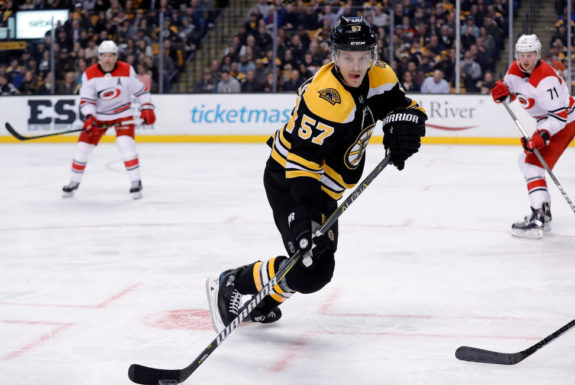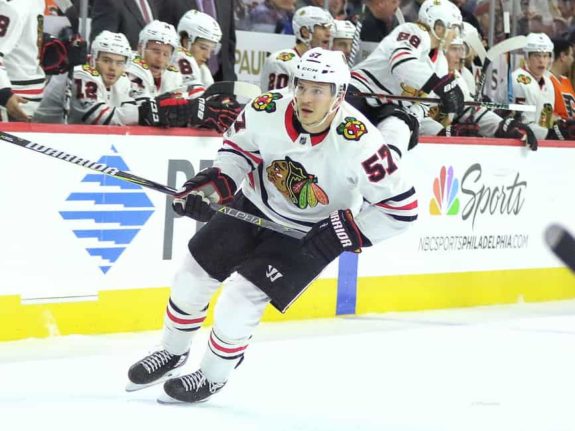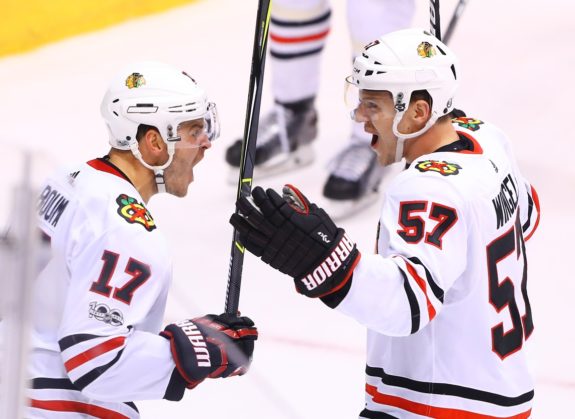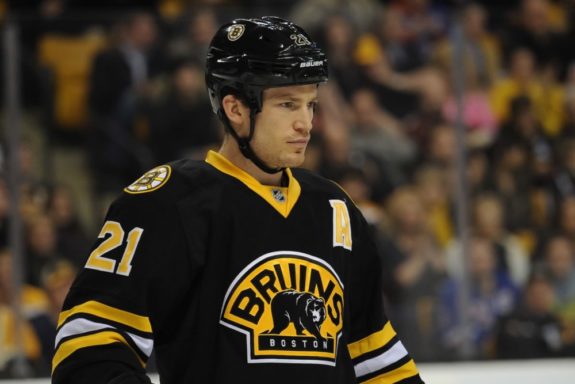It’s not often that a team spends draft capital to acquire a player they hope plays as little as possible, but that was exactly the pathos behind the acquisition of veteran forward and UFA-to-be Tommy Wingels.
That’s not a knock on Wingels whatsoever. It’s merely an acknowledgement of the fact that prior to the trade things had been clicking on all cylinders for the Boston Bruins, to the tune of a 22-5-3 record over their previous 30 games. Top to bottom, the Bruins lineup was stacked; Wingels was merely an insurance policy for the stretch run and the playoffs as a versatile, plug-and-play veteran for the team’s bottom six.
As it turns out, this is one insurance policy the Bruins are already glad they bought into, as Wingels has dressed for six of the team’s eight games since the trade. With Patrice Bergeron, David Backes and Brad Marchand all missing time in the last two weeks, the Chicago-native hasn’t skipped a beat in filling the void, bringing his tremendous work ethic, tenacious forecheck, three-zone reliability and sneaky-quick release with him to the job site. He has also been known to dish out a little punishment every now and again; something all Bruins fans like to see.

A lot can happen between now and the start of free agency, but it’s never too early to practice some forward thinking. And Tommy Wingels (as well as some lingering Boston Bruins-related questions) has this writer doing just that:
Should the Bruins bring back Tommy Wingels next season?
Versatility
“Versatility” is one of the most hackneyed and overused words in all of sports. Basically, if an athlete can brush their teeth and check their email simultaneously they’re considered “versatile” in 2018. It’s essentially the sports soundbite version of “Tastes like chicken.”
But Tommy Wingels is actually versatile.
First and foremost, he’s capable of playing all three forward positions. Though best suited as a bottom six option, he’s a strong enough skater and hard enough worker to keep up with top six talent and add a grinding, workmanlike element to a skill line. The 29-year-old did just that in the weeks leading up to his move to Boston, playing on a line with Jonathan Toews and Brandon Saad.

He has reached the 15-goal plateau twice in his career and has eclipsed 200 hits and 50 blocked shots three times, while also averaging one minute or more per game of shorthanded ice time. He even averaged better than one minute per game on the power play in back-to-back seasons as a member of the San Jose Sharks.
He hasn’t exactly set the world ablaze offensively this season, with eight goals and 15 points across 63 games between Chicago and Boston. But his ability to play all over the lineup while pitching in on the penalty kill makes him exactly the kind of jack-of-all-trades role player that Boston has historically welcomed with open arms. Think Chris Kelly, Max Talbot, Dominic Moore, Riley Nash, et cetera.
Speaking of Riley Nash
Riley Nash has been the biggest surprise this season for a Boston Bruins team full of pleasant surprises. In my opinion, he’s a shoo-in for the team’s “Seventh Player Award.” Utilized almost exclusively last season as a fourth-line winger, Nash is back to his natural center position this year, turning the team’s third line back into a major strength while also filling in for Patrice Bergeron on the top line on two separate occasions.

His 13 goals, 25 assists and 38 points in the current campaign all register as career highs, with 14 games remaining for the Alberta-native to build upon those numbers.
He’s also on the last year of a contract which carries an average annual value of just $900,000.
Riley Nash is about to get paid, and odds are it won’t be by Boston. With the previous regime throwing money at bottom six forwards as though they were at an Atlanta gentleman’s club, even more incentive than just common sense exists for general manager Don Sweeney to not follow suit.
Riley Nash will be joined by Tim Schaller and newcomer Brian Gionta as bottom six forwards set to reach unrestricted free agency. Austin Czarnik’s lack of use at the NHL level will result in an opt-out clause in his contract kicking-in, giving him UFA designation as well.
With a fair amount of uncertainty facing their bottom six, extending Tommy Wingels may not be the worst idea. He’s earning just $750,000 on his current deal, while not significantly exceeding the expectations that come along with such a cap hit. In him, the Bruins could lock-up their heir apparent to Riley Nash on a contract much closer to the one Nash is currently playing on, as opposed to the one Riley seems destined to receive come free agency in July.
He’s Also A Good Guy!
In addition to being an incredibly useful and cost-effective player, Tommy Wingels is also a good human being, having been nominated for both the Bill Masterton Trophy and King Clancy Award during his eight-year career.

The 2017-18 Bruins have iced a total of 10 players age 23 or younger this season. With youngsters such as Ryan Donato, Jakob Forsbcka-Karlsson, Jakub Zboril and more on the horizon, having a man of Wingels’ character, integrity, experience and leadership in the room could prove invaluable to a young Bruins squad which will aim to maintain the organization’s current place amongst the league’s top teams.
Off the ice, his work with the “You Can Play” initiative shows that there’s more to him as a leader than delivering a rousing locker room speech or practicing at full-tilt. He can show a young roster how to be a professional and, more importantly, how to be a man and a role model while cashing paychecks that would make 99% of this planet blush; something that is easier said than done.
Defenseman Torey Krug stated less than two years ago that there was a leadership vacuum within the Boston dressing room, one which no doubt played a significant role in the organization’s back-to-back seasons without playoff hockey. A veteran core of Mark Recchi, Shawn Thornton, Andrew Ference and Chris Kelly (among others) had been whittled to nothing.

David Backes was brought in to address the issue, while several Bruins already on roster have matured into the role of “leader.” Wingels, at what figures to be a cap hit of less than $1 million per season, would only add to that, with no detriment to the team’s fiscal viability.
Bring Him Back
The Bruins have an exorbitant amount of young talent in the pipeline and already on roster, so I wouldn’t be surprised if the thought of re-signing a soon-to-be 30-year-old role player doesn’t knock your socks off, or at least sound like a prudent move. But there’s a heck of a lot more that goes into winning hockey games and championships than merely fielding the most talented team.
Teams need gritty, gutsy individuals who don’t mind paying the price and sacrificing their body to block a shot, win a battle along the boards or deliver a momentum-altering, tooth-rattling body check.
They need players who can step into multiple roles with comfort and ease, either filling-in for an injured teammate or merely giving someone a much-needed breather. Someone who can play up and down the lineup and not look out of place, preferably on a team-friendly contract.
Teams need leaders; guys who can set examples for young players both on and off the ice.
In short, teams need Tommy Wingels.
The Boston Bruins currently have him. And if they’re smart, they’ll keep him.